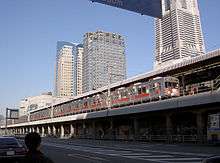Sakuragichō Station
JK11  Sakuragichō Station 桜木町駅 | |
|---|---|
|
Sakuragichō Station as seen from the top of the Landmark Tower, August 2014 | |
| Location |
1 Sakuragichō, Naka-ku, Yokohama, Kanagawa (神奈川県横浜市中区桜木町1丁目) Japan |
| Operated by | |
| Line(s) |
|
| Connections | Bus terminal |
| History | |
| Opened | 1872 |
| Previous names | Yokohama (until 1915) |
| Traffic | |
| Passengers (JR East, FY2013) | 65,392 daily |
Sakuragichō Station (桜木町駅 Sakuragichō-eki), is a railway station in Naka-ku, Yokohama, Japan, operated by East Japan Railway Company (JR East) and the Yokohama Municipal Subway.
Lines
Sakuragichō Station is served by the JR East Negishi Line (Keihin-Tohoku Line), with some services through-running to and from the Yokohama Line, and also by the Yokohama Municipal Subway Blue Line (station number B18).
Station layout
JR East
The JR East station consists of two elevated island platforms serving three tracks.
| 1 | JK Negishi Line | for Isogo and Ōfuna |
| 2 | JK Negishi Line | (Terminating services, alighting only) |
| 3-4 | JK Negishi Line | for Yokohama, Kawasaki, Tokyo, and Ōmiya |
| JH Yokohama Line | for Shin-Yokohama, Nagatsuta, Machida, Hashimoto, and Hachiōji |
The station has two sets of ticket barriers ("North" and "South" gates), with entrances on the east and west sides (four in total). The station has a "Midori no Madoguchi" staffed ticket office, next to the South gate.
- The north-east entrance, August 2014
- The north-west entrance, August 2014
- The south-west entrance, August 2014
- The south-east entrance, August 2014
- The north gate ticket barriers, August 2014
- The view looking south from the end of platform 1/2 with the terminating middle track on the right, January 2015
Yokohama Municipal Subway
The Yokohama Municipal Subway (Blue Line) platforms are located on the 4th basement level, south of the main station.
| 1 | ■ Blue Line | for Kannai, Kamiōoka, Totsuka, and Shōnandai |
| 2 | ■ Blue Line | for Yokohama, Shin-Yokohama, and Azamino |
Adjacent stations
| ← | Service | → | ||
|---|---|---|---|---|
| Negishi Line JK11 | ||||
| Yokohama YHMJK12 |
Rapid | Kannai JK10 | ||
| Yokohama YHMJK12 |
Local | Kannai JK10 | ||
| Yokohama Subway Blue Line (Line 3) (B18) | ||||
| Kannai (B17) | Rapid | Yokohama (B20) | ||
| Kannai (B17) | Local | Takashimachō (B19) | ||
History
Sakuragichō is one of Japan's oldest stations. It opened on June 12, 1872, as the original Yokohama Station when the service between Shinagawa and Yokohama provisionally started. The station was renamed Sakuragichō Station on August 15, 1915, when the then-new and second Yokohama Station opened near Takashimachō Station. Yokohama Station was relocated again after the 1923 Great Kantō earthquake, to its third and current location.
Between March 31, 1932, and January 30, 2004, Sakuragichō Station was the terminus of the Tokyu Toyoko Line.
The north gate ticket barriers were opened on 1 July 2014, with the passageway linking the east and west sides opened to the public on 16 July.[1] A new commercial and shopping complex, called "Cial", adjoining the north side of the station was also opened at the same time.[1]
 Yokohama Station in 1872
Yokohama Station in 1872- Sakuragicho Station circa 1930
 The former Tokyu Toyoko Line platforms in January 2004
The former Tokyu Toyoko Line platforms in January 2004 The east side of the station in 2007 before the addition of the north entrance
The east side of the station in 2007 before the addition of the north entrance
Accidents
On April 24, 1951, a 63 series Keihin Line (now part of the Negishi Line) train approaching the station caught fire when the train hit a loose overhead wire and caused a short circuit. The fire killed 106 and injured 92.[2]
Passenger statistics
In fiscal 2013, the station was used by an average of 65,392 passengers daily (boarding passengers only).[3] The passenger figures for previous years are as shown below.
| Fiscal year | Daily average |
|---|---|
| 2000 | 70,610[4] |
| 2005 | 65,627[5] |
| 2010 | 61,536[6] |
| 2013 | 65,392[3] |
Surrounding area
The station is located near the Minato Mirai 21 district and Yokohama Landmark Tower. Other stations in the vicinity include Minatomirai Station on the Minatomirai Line.
- Sakuragicho Station with Yokohama Landmark Tower in the background, April 2007
- The west side of the station, August 2014
- The TOC Minato Mirai building adjoining the station, February 2012
References
- 1 2 JR桜木町駅 7月に商業施設CIAL開業 先立ち北改札も開設 [JR Sakuragicho Station: Cial commercial facility to open in July, with north gate opening earlier]. Kanaloco (in Japanese). Kanagawa Shimbun. 27 May 2014. Retrieved 22 September 2014.
- ↑ Saito, Masao. "Japanese Railway Safety and the Technology of the Day". Japan Railway & Transport Review (33): 4–13. Retrieved August 3, 2008.
- 1 2 各駅の乗車人員 (2013年度) [Station passenger figures (Fiscal 2013)] (in Japanese). Japan: East Japan Railway Company. 2014. Retrieved 12 February 2015.
- ↑ 各駅の乗車人員 (2000年度) [Station passenger figures (Fiscal 2000)] (in Japanese). Japan: East Japan Railway Company. 2001. Retrieved 12 February 2015.
- ↑ 各駅の乗車人員 (2005年度) [Station passenger figures (Fiscal 2005)] (in Japanese). Japan: East Japan Railway Company. 2006. Retrieved 12 February 2015.
- ↑ 各駅の乗車人員 (2010年度) [Station passenger figures (Fiscal 2010)] (in Japanese). Japan: East Japan Railway Company. 2011. Retrieved 12 February 2015.
External links
| Wikimedia Commons has media related to Sakuragichō Station. |
- JR East Sakuragichō Station (in Japanese)
- Yokohama Subway Sakuragichō Station
- Bus Terminals at Yokohama & Sakuragichō Stations
- Sightseeing areas near Sakuragichō Station
Coordinates: 35°27′03″N 139°37′52″E / 35.45083°N 139.63111°E